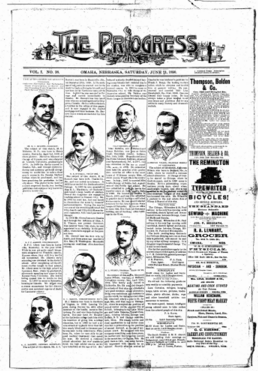Ferdinand L. Barnett (Omaha) facts for kids
Quick facts for kids
Ferdinand L. Barnett
|
|
|---|---|
| Member of the Nebraska Legislature from the 10th district |
|
| In office 1927–1928 |
|
| Preceded by | Bernard R. Stone |
| Succeeded by | M. J. Gardiner |
| Personal details | |
| Born |
Ferdinand Lee Barnett
July , 1854 Huntsville, Alabama, U.S. |
| Died | July 18, 1932 (aged 77–78) Omaha, Nebraska, US |
| Political party | Republican |
| Spouses | Alice, Hattie Hunter |
| Alma mater | Fisk University |
| Occupation | Journalist, Civil servant |
Ferdinand Lee Barnett (July 1854 – July 18, 1932) was an important person from Omaha, Nebraska. He was a journalist, which means he wrote for newspapers. He also worked to make things fair for everyone as a civil rights activist. Later, he became a politician and a civil servant, working for the government.
Ferdinand Barnett started his own newspaper called The Progressive. It was published from 1889 to 1906. He also worked as a deputy clerk in the county court. In 1926, he was elected to the Nebraska State House of Representatives.
Early Life
Ferdinand Lee Barnett was born in July 1854, in Huntsville, Alabama. His parents were F. L. Barnett and Sarah Erskine. He went to Rusk School in Huntsville. He also studied at Fisk University in Nashville.
In the 1880s, Ferdinand moved to Omaha. His brother, Alfred S. Barnett, who was also a journalist and activist, moved with him. Alfred later moved to other cities, but Ferdinand stayed in Omaha. He lived there until he passed away on July 18, 1932, from heart disease. His funeral was held at St. John African Methodist Episcopal Church. He is buried at Forest Lawn Cemetery.
Ferdinand Barnett was married twice. His first wife was named Alice. On October 7, 1925, he married Hattie Watts (born Hunter). She was from Sparta, Illinois.
Starting a Newspaper
Before he started his newspaper, Barnett was already active in the black community in Omaha. In 1895, he was part of the Omaha branch of the National Afro-American League. This group worked for the rights of African Americans. He also served on the Press committee with George F. Franklin. In 1896, he was chosen as an alternate delegate for the Republican National Convention. In 1897, he got an important public job as a sidewalk inspector in Omaha.
In 1889, he started The Progress. This was the first newspaper in Omaha made for the black community. Through his newspaper, he became influential both locally and across the country. In 1901, he was elected vice president of the Western Negro Press Association. His newspaper continued until 1906. In the same year, he worked as a deputy clerk for Judge Irving Baxter. He also ran for city alderman. He worked with James Bryant on the paper.
Around the same time, two other important African-American newspapers began. In 1892 or 1893, Cyrus D. Bell started the Afro-American Sentinel. In 1893, G. F. Franklin began publishing the Enterprise. The Progress was known for supporting the Republican Party. The three newspapers sometimes had different ideas. For example, in 1895, after Booker T. Washington gave his Atlanta Compromise Speech, The Progress did not agree with his ideas of compromise. However, Franklin's Enterprise supported Washington, and Bell's Sentinel strongly agreed with him.
Becoming a Politician
In May 1921, Ferdinand Barnett was appointed as a custodian for the police station. Later, he became a janitor at the county jail.
Barnett decided to run for state senator in 1924. He did not win that election. But he ran again in 1926 and won! His campaign was very simple. He said he just went "from house to house" and asked people to vote for him. He did not spend any money or give speeches. He even used old campaign cards from 1924, just changing the date. He received 1,076 votes. The other candidates were C. D. Bogue, who got 130 votes, and Ralph E. Roche, who got 935 votes.
The first law Barnett helped introduce was about mob violence. It said that any county where mob violence or lynching happened would be responsible for paying for damages to the victim or their family. This law passed. In 1926, Ferdinand Barnett and John Andrew Singleton were the only two black men elected to the Nebraska House of Representatives.
Barnett ran for reelection in 1928. He won the first round of voting by only two votes. However, he lost in the main election to M. J. Gardiner. In the 1930 election, the votes were first counted as a tie. Barnett challenged the result in court.
In 1931, a year before he passed away, Barnett was removed from his job as a janitor by the Police Commissioner.
 | Aurelia Browder |
 | Nannie Helen Burroughs |
 | Michelle Alexander |


